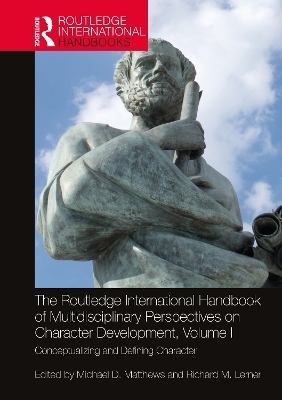
The Routledge International Handbook of Multidisciplinary Perspectives on Character Development, Volume I
Routledge (Verlag)
978-1-032-16949-1 (ISBN)
Drawing from philosophy, religion, biology, behavioral and social sciences, and the arts, The Routledge International Handbooks of Multidisciplinary Perspectives on Character Development, Volumes I and II, present cutting-edge scholarship about the concept of character across the life span, the developmental and contextual bases of character, and the key organizations of societal sectors, within and across nations, that promote character development in individuals, families, and communities.
This first volume, Conceptualizing and Defining Character, explores the foundations of the field by providing an array of interdisciplinary approaches to character development, including economics, education, law, literature, military science, philosophy, and many more. With contributions from international experts, Volume I brings together cutting-edge research and discusses instances of character development, including civic character, courage, fairness, forgiveness, gratitude, morality, tolerance, and thankfulness.
This comprehensive publication is an essential reference for researchers and graduate students in behavioral sciences, biology, philosophy, theology, and economics, as well as practitioners leading or evaluating character education or character development programs around the world.
Find Volume II: Moderators, Threats, and Contexts here: www.routledge.com/9781032172453
Michael D. Matthews, Ph.D., is Professor of Engineering Psychology at the United States Military Academy. He has been a military psychologist since 1980. In the past 40 years, he has served on active duty as an Air Force officer (as a behavioral sciences officer), as a psychology professor at Drury University, as a research psychologist for the Army Research Institute, and, since 2000, in his current capacity at West Point. Richard M. Lerner, Ph.D., is the Bergstrom Chair in Applied Developmental Science and the Director of the Institute for Applied Research in Youth Development at Tufts University. He went from kindergarten through Ph.D. within the New York City public schools, completing his doctorate at the City University of New York in 1971 in developmental psychology. Lerner has more than 800 scholarly publications, including more than 80 authored or edited books.
Section 1: Introduction 1. Contemporary Character Development Scholarship: Multidisciplinary and International Perspectives; Section 2: Multidisciplinary Approaches to Character Development 2. Epigenetics and Character Virtue Development 3. Character Virtues in Developmental Science 4. The Economic Approach to Personality, Character and Virtue 5. PRIMED for Character Education: Deriving Design Principles for Effective Practice from Empirical Evidence 6. Changing the Character of Schools: Promoting Servant Leadership Virtues to Solve Internationally Relevant Problems in Education 7. Educating for Character in the Sexual Domain: Why It Matters and How to Do It 8. Character Development in Higher Education 9. The Use and Inculcation of Character in Law: Challenges Reflected Throughout United States’ Legal Systems 10: Character Development in Leadership and Organizational Studies 11: Contact with the vir fortis: Character Education and the Roman Practice of Declamation 12. Character Virtue Development in Military Science 13. The Philosophical Foundations of Character Virtue Development 14. Political Science Approaches to the Character Virtues 15. Character Virtues in Positive Psychology 16. Character-Minded Evaluation: Recognizing and Activating the Essential Role of Character in High-Quality Evaluation 17. The Culture of Character: Sociological Perspectives 18. Theological Perspectives on Beliefs and Communities of Practice: Virtue Systems as an Integrative Approach for Psychologists; Section 3: Instances of Character Development 19. Developing Civic Character 20. Courage: Moral and Physical Dimensions 21. Justice: Where Aristotle and Kohlberg Meet 22. On Forgiveness and Character Development: Description, Explanation, and Optimization 23. Gratitude: From Relational Emotion to Contextualized Virtue Inclusive of Indebtedness 24. Dynamics of Intellectual Humility 25. Intellectual Virtues 26. Kindness: A Path to Human Growth and Connectedness 27. The Development of Morality and the Character System: Implications for the Notion of Virtue 28. Personal Liberty, Mutual Respect, and Tolerance 29. Feeling Good and Feeling Thankful: The Role of Positive Emotions in Sustaining Early Prosocial Behavior 30. Purpose through the Lens of Character Virtue Development
| Erscheinungsdatum | 10.04.2024 |
|---|---|
| Reihe/Serie | Routledge International Handbooks |
| Zusatzinfo | 23 Tables, black and white; 15 Line drawings, black and white; 2 Halftones, black and white; 17 Illustrations, black and white |
| Verlagsort | London |
| Sprache | englisch |
| Maße | 174 x 246 mm |
| Gewicht | 1387 g |
| Themenwelt | Geisteswissenschaften ► Psychologie ► Allgemeine Psychologie |
| Geisteswissenschaften ► Psychologie ► Entwicklungspsychologie | |
| ISBN-10 | 1-032-16949-4 / 1032169494 |
| ISBN-13 | 978-1-032-16949-1 / 9781032169491 |
| Zustand | Neuware |
| Haben Sie eine Frage zum Produkt? |
aus dem Bereich


